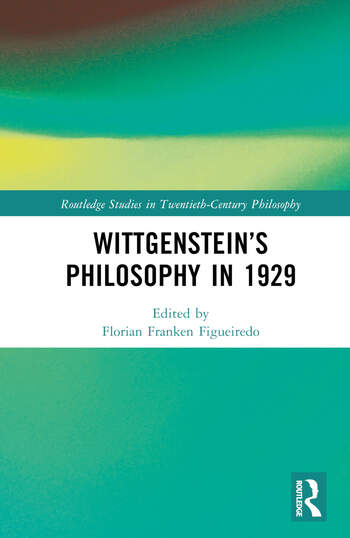Florian Franken Figueiredo
The book explores the impact of manuscript remarks during the year 1929 on the development of Wittgenstein’s thought. Although its intention is to put the focus specifically on the manuscripts, the book is not purely exegetical. The contributors generate important new insights for understanding Wittgenstein’s philosophy and his place in the history of analytic philosophy.
Wittgenstein’s writings from the years 1929-1930 are valuable, not simply because they marked Wittgenstein’s return to academic philosophy after a seven-year absence, but because these works indicate several changes in his philosophical thinking. The chapters in this volume clarify the significance of Wittgenstein’s return to philosophy in 1929. In Part 1, the contributors address different issues in the philosophy of mathematics, e.g. Wittgenstein's understanding of certain aspects of intuitionism and his commitment to verificationism, as well as his idea of "a new system". Part 2 examines Wittgenstein's philosophical development and his understanding of philosophical method. Here the contributors examine particular problems Wittgenstein dealt with in 1929, e.g. the colour-exclusion problem, and the use of thought experiments as well as his relationship to Frank Ramsey and philosophical pragmatism. Part 3 features essays on phenomenological language. These chapters address the role of spatial analogies and the structure of visual space. Finally, Part 4 includes one chapter on Wittgenstein’s few manuscript remarks about ethics and religion and relates it to his Lecture on Ethics.
Table of Contents
Introduction: Wittgenstein in 1929 Andrew Lugg
Part 1: Mathematics and Thinking the New
1. Wittgenstein’s Struggle with Intuitionism Mathieu Marion and Mitsuhiro Okada
2. The Origins of Wittgenstein’s Verificationism Severin Schroeder
3. Searching in Space vs. Groping in the Dark: Wittgenstein on Novelty and Imagination in 1929-30 Pascal Zambito
Part 2: Method and Development
4. The Color-Exclusion Problem and the Development of Wittgenstein’s Philosophy of Logic Oskari Kuusela
5. What Would It Look Like? Wittgenstein’s Radical Thought Experiments Mauro Luiz Engelmann
6. Phenomenological Language: "not possible" or "not necessary"? Florian Franken Figueiredo
7. Hypotheses as Expectations: Ramsey and Wittgenstein 1929 Cheryl Misak
Part 3: Phenomenology and Visual Space
8. Simplicity in Wittgenstein’s 1929 Manuscripts Michael Hymers
9. Temptations of Purity: Phenomenological Language and Immediate Experience Mihai Ometiță
10. Speaking of the Given: The Structure of Visual Space and the Limits of Language Jasmin Trächtler
Part 4: Ethics
11. The Good, the Divine, and the Supernatural Duncan Richter
